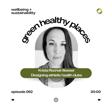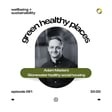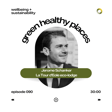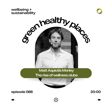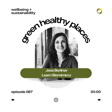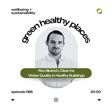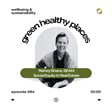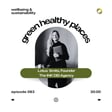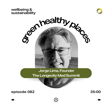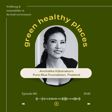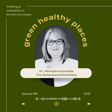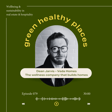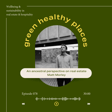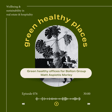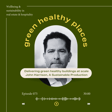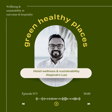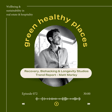Introduction to Green Healthy Places Podcast
00:00:12
Speaker
Welcome to Episode 77 of the Green Healthy Places podcast, in which we discuss the themes of wellbeing and sustainability in real estate and hospitality today. I'm your host, Matt Morley, and in this episode, I'm in London talking to James Fry, founder of Beyond Apartments and Apart Hotels.
Overview of BEYOND's Sustainable Offerings
00:00:35
Speaker
Having launched in 2021, BEYOND are now the UK's leading sustainable service department, Apart Hotel, and Build to Rent, or BTR, operator. The brand has a pipeline of Apart Hotel projects across the UK, partnering with future-focused owners, developers, and investors. Current sites are located in London's Fitzrovia, which is the one I went to visit recently, as well as Waterloo and the West End.
00:01:04
Speaker
carbon neutral, low waste and low toxicity. The Beyond spaces are billed as being healthier,
00:01:12
Speaker
environments in which to stay, live and work. They also have a really engaging concept of sustainable wellness that we will explore in more detail in the conversation.
James Fry's Experience and Role
00:01:24
Speaker
James has over 12 years of experience in the hospitality industry. He was previously managing director of Base Apart Hotels in Switzerland, so he has all the right pedigree. In other words, let's get into it. Here's James Fry of Beyond Apartments and Apart Hotels.
Understanding Apart Hotels
00:01:41
Speaker
James, I'd love to define if we could some terminology to start. These words are floating around in the world of real estate and hospitality for a while now, but the idea of an apart hotel and a serviced apartment concept. How do you pick them apart? Or do you see this as specifically a new concept in the world of hospitality or rather an evolution of things as they were previously?
00:02:07
Speaker
I think, you know, the idea behind service departments, Aparta tells us extended stay, as they're called in America. I've been around for a while. They're much bigger in the US and Asia. I like to define service departments as more residential stock. It may have limited facilities and be a mix of one, two and three bedroom apartments.
00:02:34
Speaker
where people come for long-term stays in general. Apart hotels, which is very much the terminology in Europe, tend to be hotels in every way you think of them. So we have a restaurant, we have a bar, we have maybe a roof terrace bar.
00:02:54
Speaker
We'll have gyms and so forth. The big difference being that we have slightly larger rooms with kitchens in them. But that changes a lot. That means that guests have more convenience, more flexibility about how they live when on site. And they have the choice about eating out.
00:03:14
Speaker
getting a takeaway or cooking in the room. It gives them slightly larger space and also a space to relax. And much like you might have in an apartment, you have a place to sleep, wash, eat, cook and relax. You have that in an apart hotel room. And what that then means is that people tend to stay slightly longer on average.
00:03:39
Speaker
Does that then relate to any specific market dynamics working in favour of this type of concept? Is there, in a sense, a response to demand for longer stays? Are people now just travelling and staying for longer?
Rising Demand for Apart Hotels
00:03:56
Speaker
Yeah, it's funny. It's always been a slightly overlooked part of the market. Everyone's concentrated
00:04:02
Speaker
very much on hotels. I think there's been a race to the bottom of how small can we make a hotel room and get away with it. There's chains that have got 14 square meter rooms that do very well. They serve a strong need. It's funny, during COVID, the sector of the market that performed least worse was the apartheid market. And I think also as
00:04:32
Speaker
travel habits have slightly changed after that. Certainly corporates are looking for their employees to travel slightly less but when they do travel stay slightly longer and I think there's also been an emergence
00:04:48
Speaker
partly because of Airbnb of people saying, actually, this works, you know, I like the ability to be able to, to stay in to cook, put some stuff in the fridge and often we get asked how often do people really use the kitchens in the rooms and it's, it's, it's
00:05:06
Speaker
not relevant to how often they cook, the relevance is that they have that convenience there. They can have a plate, they can warm something up, they can use a coffee machine, they can put some beers in the fridge and so forth. So we tend to find that once people have used the concept they won't go to anything else. They'll look for other apartheid towns or experiences in different locations. So if
00:05:30
Speaker
I think there's been a growing awareness of the market. There has been more stock coming out as actually the fastest growing part of the hospitality market. There have been new brands that have come out with better products than were available before. So I think there's been a number of drivers and we're going to see good growth in the sector over the next five to 10 years.
00:05:57
Speaker
So that's the big picture. You've then set out your stall very clearly around sustainability and around health and wellbeing as part of that guest experience. So if you map those two together, then what have you learned around the type of guest and customer clients that you're attracting? You mentioned corporates. How do those different axes interconnect around the type of people who have begun already to pick up on what you're doing and to be attracted by that proposition?
Sustainability as Core Value at BEYOND
00:06:26
Speaker
I think first and foremost is that we wanted to create a
00:06:32
Speaker
a company that aligned with our values and beliefs. We say that we're a sustainable company first that happens to provide accommodation solutions. So that means from the ground up, part of our DNA, every decision we make is based around finding a low impact and healthy solution to then create the product that we offer and the services that we give to our guests.
00:07:00
Speaker
So what we have found over the last few years, and previously I did another part hotel concept along the similar lines in Switzerland, was that what we call a growing minority of individuals
00:07:17
Speaker
feel very strongly about this because it aligns with their values and beliefs and they will search out products and services that offer that. We've also seen the corporate market changing quite dramatically certainly even in the last 12 months as they are being forced to by legislation to find suppliers that offer
00:07:38
Speaker
low impact solutions partly because of the scope three emissions which they're having to declare more and more in their annual reports. Again the companies that are really doing it are the sort of new age companies, the sort of tech companies, they understand where the world is going in the future, they are aligned
00:08:02
Speaker
many of their values and also in terms of their employees, and they are looking for solutions that provide something that creates a less impact in the world.
Corporate Synergy with Sustainable Practices
00:08:15
Speaker
In particular, people like Google, people like Apple, they actually have identified that if they provide low toxicity, healthier spaces for their staff, their staff perform better.
00:08:30
Speaker
and that's what we're looking to do in our building. So we think if people can see the health benefits of staying there then they get what's in it for me today. They also like the carbon story but you have to appeal to people to say here's a benefit for you today who's staying with us and also we offer a solution that is low waste, low water usage and
00:08:56
Speaker
and has a low carbon story behind it as well and we only see that growing in the future.
Addressing Carbon Emissions and Supply Chain
00:09:05
Speaker
Should we just double click on the term that you use there, scope three carbon emissions for anyone who's not familiar and how that
00:09:13
Speaker
ties into the bigger picture, but clearly that is kind of the gold standard in terms of declaring your carbon emissions. I think most companies are currently at most scope two, but for anyone who's curious to understand what that equates to, perhaps you could just summarize how a company would go about considering their scope three emissions kind of indirectly down the value chain.
00:09:36
Speaker
I mean really that's all about who you buy from, your supply chain. So it's the decision you make every day about where you spend your money. I think there's a famous quote I'm sure you'll know about, we vote every day with our wallet. And it's really about who you buy from and then
00:09:57
Speaker
what that company that makes that product supplies that service, how they produce that, and what their emissions are to do that to then give you that service or product. So that is vital that in the last two, three, four years, there have been a myriad of very innovative, interesting companies that have come out of the woodwork with the same values that we start our company on.
00:10:23
Speaker
And those people do everything they can to reduce their emissions. An example would be someone like Coats Paints, who we use, who make everything in the UK. You send back your pots to them and they recycle. Aside from those, they have a very, very small amount of VOCs. I think it's 0.2%. So that's harmful toxic substance, which is a lot of paint. They send you swatches rather than little pots of paint that often get wasted. They give you a self-addressed envelope and you send it back to them.
00:10:52
Speaker
everything they do is about lowering their impacts. If you buy from them rather than another company you are in turn reducing your impact and by staying at someone like a beyond you are in turn reducing your impact.
00:11:08
Speaker
Got it. Nice. So you have several townhouse sites in London sort of signed, opened in the pipeline. What are the key characteristics then in terms of a given location for it to work for a beyond concept? There's a sustainability angle. I wonder, does it limit your site selection opportunities in any way? Does it open up new opportunities? So what are you looking for when you're out there hunting down that next site?
00:11:38
Speaker
I think to answer your question, does it limit our opportunities? Yes, it does because we won't compromise on our values. We have a lot of people come to us and say that we've got this hotel, can you do some of your green stuff? And we can tick the box. And we say, unfortunately, not. We look for refurbished buildings or to refurbish buildings ideally.
00:12:07
Speaker
We then concentrate on how that's built in particular insulation, in particular the windows and then going towards
00:12:20
Speaker
The materials that we use in those rooms, whether it be the paints, whether it be the floorboards, whether we don't have any glues in those floorboards, they're clicked together. The materials that we use in the rooms and the sofas and chairs and the curtains and that kind of stuff that must be as close to zero toxicity as possible. So there are some limitations if we're working with developers. We have our brand standards that they need to fit those sites out for.
00:12:50
Speaker
going forward we'll be developing our own sites and then you know we will be concentrating on building and fitting out those rooms in the the best possible and lowest impact way. So you mentioned insulation for anyone questioning that that would be about heat loss therefore energy efficiency which leads us to the question around energy. The UK is in a pretty good place around green energy on the grid so how do you
00:13:20
Speaker
How much of a factor is that in the decision-making process? Is it something that you can take on a site and adapt it? You can switch to green energy from the grid. You can perhaps look at adding some solar panels on the roof. How do you think about the energy piece when you're selecting a site? Going back
Energy Efficiency and Carbon Neutral Goals
00:13:38
Speaker
to looking and measuring how much energy is used and then where possible, generating our own energy on site, being 100% electrical.
00:13:49
Speaker
is very important to us. And then buying from, we buy from what we consider and consider the market the greenest energy provider in the UK called Green Energy UK. They only sell what they generate by credits and so forth or stop selling if they haven't gone off energy they're generating to new parties.
00:14:13
Speaker
So we have been audited twice in terms of our energy use, our waste generation, our water usage, how we get to work and so forth. And we score particularly well or zero for our carbon output on our energy usage. But first and foremost thing is really to look at ways to reduce the amount of energy you use in a building and then look to where you get that energy from.
00:14:44
Speaker
You mentioned the term volatile organic compounds in relation to the paints going into your spaces, so minimizing the VOCs in your in-room experience, which then is about enhanced indoor air quality, which connects with the comment you made a little previous to that around
00:15:06
Speaker
brands such as Google and Apple, considering the wellness credentials of the spaces where their staff work and in relation to you, where they stay when they're on a business trip. So that air quality piece and the idea of a healthy indoor environment, what else have you done thus far at least to sort of implement and roll that out to deliver, let's say, a clean, natural indoor experience in the room?
00:15:34
Speaker
Yeah, so in touch on VOCs, volatile organic compounds, what we also do in terms of operations is we use zero chemicals to clean. We use a water and salt based solution that passes through an electric current.
00:15:51
Speaker
that changes the water and salt solution to make it an antibacterial solution which kills 99.9% of bacteria. We use that on floors, on kitchen surfaces, in bathrooms, in commercial kitchens.
00:16:06
Speaker
and so forth. I used it for five years in the hotel in Switzerland. That's all we used. Absolutely fantastic stuff. And then we also use ozone to clean our linen or our sheets and towels. That is chemical free. It actually is washed at 30 degrees. Ozone is a company name. It's a company name.
00:16:27
Speaker
provider? Yeah, the company is a company called Oxwash, a fantastic company. Again, the company that's only been founded in the last two or three years to provide solutions like this. They actually deliver it on cargo bikes or in electric vehicles. Again, it's the whole thing. It's not just the front
00:16:43
Speaker
product and what they do is everything they've thought about, which appeals to us. And that creates spaces which are dramatically lower in toxicity than a standard hotel room. Again, there's a term that there's very few places as toxic as a clean hotel room. If you clean your bedroom every single day with a heavy toxic material and wash those sheets every single day with a heavy toxic chemicals,
00:17:13
Speaker
you are going to notice the effect. And a lot of people travel, and they wake up with a bit of a sniff in the morning. And they go, oh, the plane or the air conditioning. What they don't realize is, yes, that could be part of it. It's probably their body reacting and going, what the hell is this stuff coming in? This is not good for you.
Non-toxic Practices and Customer Experience
00:17:31
Speaker
Create some mucus, stop it coming in. It makes you feel a bit groggy. This is, again, what the companies we mentioned earlier are doing. Their offices, they see their employees working 3% to 4% smarter, better.
00:17:43
Speaker
and also there's a social value for health, we want to do the same for our guests and very importantly for our staff. Staff particularly maids, which is a forgotten piece of the hospitality equation, suffer from 40% more respiratory diseases than the general population. They suffer from eczema of the hands. They're often handling and breathing in these heavy chemicals. So there's a benefit to them as well. And just to tell you a quick story,
00:18:11
Speaker
that was very powerful in my experience. We had a family come and stay with us at my previous hotel, Jane, and they stayed us for a couple of nights out of five, and the mother came down and said, can I speak to the manager?
00:18:25
Speaker
I came out and said, yes, can I help? And she said, look, my son has a number of medical issues, and we have traveled all around the world and stayed at probably 50 to 60 hotels and been to specialists and hospitals and so forth. Every single hotel he stayed in, he touches the surface, he touches his skin, it comes out in a rash. He's been physically sick in some hotels. And she was quite sort of
00:18:49
Speaker
powerful American lady and she looked me in the eye and said, I'm not asking you, I don't want to know, I demand to know what you are doing different so I can find more hotels like you. And that was a very powerful moment where I realized the kind of effect you can have on people and the benefit of doing what we're doing. It also
00:19:09
Speaker
causing me some concern about what other people are doing and how much effect that has on other people as well. So that's what we do in our spaces. Does any hotel in London is obviously dealing with the
00:19:22
Speaker
negative slash generally very low quality outdoor air,
Air Quality and Filtration Innovations
00:19:28
Speaker
right? So by the fact that that's your fresh air intake is coming from central London, especially when someone like Fitzrovia or Waterloo, there's a great bit of tech out there published and maintained by King's College around air quality standards all around London. And it's pretty depressing news when you keep an eye on that.
00:19:50
Speaker
Have you looked at that sort of filtration system for what's coming in from outside? Is that something you've been able to tackle yet or is that kind of a next level? We've got an air filter in one of our sites currently. It's something we have spoken to a number of companies about and will be implementing across the board in our Aparto tiles. Again, it's easy to fit at the earlier stages rather than to retrofit.
00:20:16
Speaker
So you're exactly right, it's vitally important that you're not pumping street air into the room. We've been working with a company that take out the PM 2.5s and 10s and say that the air that they put into the room is 95% cleaner than the air on the street. And that is something that we will be implementing as we go forward.
00:20:42
Speaker
So PM2.5, PM10 particulate matter, the really tiny stuff, 2.5 and the slightly bigger pieces, PM10, mostly dust particles that accumulate and cause respiratory problems for
Waste Minimization Strategies
00:20:53
Speaker
many of us. So in relation then to waste, if we kind of flip from air to,
00:20:59
Speaker
waste and recycling and how as a hospitality operation, as with a service department angle, you tackle that. You know, it's clearly a huge amount of waste produced by a typical hotel. Have you managed to reduce or find efficiencies
00:21:15
Speaker
with your operational waste and I know you're sort of positioning around this zero waste space which is I think really innovative. I don't see many people in fact hardly anyone talking about that at the moment in the hotel world so I really picked up on that. I thought you could just drill into that for us a little bit. Yeah of course I think waste is the sort of forgotten piece of the equation in a way because a huge amount of energy water transport is normally involved in getting
00:21:45
Speaker
or making something and getting it to somewhere, often for it just to be left or unused. To begin with, we have a concept called SCM, functional comfortable modern. If something doesn't serve a function that adds to the comfort of the guess in the modern way, it doesn't go in our rooms.
00:22:03
Speaker
You know when you go in some hotel rooms and there's just stuff everywhere, magazines, there's vases, there's throws, there's scattered cushions and so forth, all of that stuff has to be made, all that has to be transported, all of that has to be maintained, has to be cleaned and so forth. So we limit the kind of stuff and we make it so the rooms really work for the guests.
00:22:22
Speaker
without loads of stuff in it. We then completely reduce the need for one time use plastic in our rooms.
00:22:34
Speaker
I think recycling has been sold to us as a green solution. It's a terrible solution. I know you all know that, but it really is a very poor solution. Reuse is the only way forwards. And again, that's just about changing your supply chain, people that provide stuff to you, refilling rather than throwing away. I'm still amazed by how many hotels I go to and still find the small bottles in their rooms, which I think is just extraordinary.
00:23:03
Speaker
And what we can't do so much of is prevent our guests from generating waste. They will bring their own items in there and often leave many of them behind, half used. We will be doing two things going forward. We will look to have a zero waste shop and concept on site where people can order on an app and that can be put in their rooms. They can go downstairs and buy.
00:23:30
Speaker
but also what we see a lot of and I had this in the early part of my career where I would meet guests and I'd see them in the bags of shopping and I'd go and say goodbye to them and they're checking out a few weeks later and I'd see half the items they walked in with left on the side and half opened and so forth and we throw it away. They come back two weeks later and I'd see them walk in with exactly the same items. Food items, not that sort of fashion.
00:23:58
Speaker
Sorry, yeah, it's not that kind of stuff. So what we thought we'd do, which as far as I'm aware, we're the only people who do do, we provide something called a Beyond the Box. And if people rebook, they can put those food items into and drink items and clothes or toiletries, whatever they want into that box, we will store that safely. And when they come back to a completely different room, they find that in their room.
00:24:21
Speaker
I think a lot of saving is providing more convenient, better solutions to the consumer, to the guests and say, look, they go, well, this is great. This is certainly money. This is convenient for me. And also it's low waste. We're doing it because it reduces the amount of waste that they generate. So if they can have those kind of tools, then that helps them to do so. So we can't yet say by any means that we are zero waste and we have to include the waste that our guests
00:24:49
Speaker
as a company, we are very far down that path, but we're looking at providing innovative ways to reduce that as close to zero as we can.
Personalized Services for Guest Experience
00:25:02
Speaker
Because obviously what you're not doing is providing the
00:25:06
Speaker
quintessential show off moment for many hotels of the breakfast buffet, right, where a hotel manager can sort of, you know, do their thing and show how extravagant a hotel or not it may be. You've taken that away completely and clearly that
00:25:23
Speaker
doesn't necessarily require a different understanding of the luxury experience, but it is a very different way of thinking about what a serviced guest experience means, right? You're removing that, but on the basis of your guests being people who have some sense of
00:25:41
Speaker
Some existing consciousness of what possible ways that might represent and perhaps they just simply have their own tastes and preferences right and so you're able to You're suggesting will look rather than offer all things to all men in one buffet experience We're just going to provide you with exactly what you need and you can buy it literally by by weight eventually in a zero waste store right so it's sort of just Just reducing it to the essential
00:26:06
Speaker
Yeah, I mean, that's our beyond breakfast bag concept where people can order exactly what they want on a daily basis and we'll put it outside their door. It only works because we are on a party tell, so they have kitchens and plates and glasses and coffee machines and so forth in their room. And, you know, we've all seen it. Yes, that lavish buffet.
00:26:26
Speaker
At the end of the breakfast service, half of that has to be thrown away, the croissants and the fruit and so forth. And people overindulge as well, which is not a form of waste. So by doing this, people order what they want. They only pay for what they want. So generally dramatically reduces the cost and also reduces the amount of waste that is generated.
00:26:52
Speaker
We have a number of people who come in and say, okay, great, but I'm used to the buffet breakfast. Where would I find that? I said, it's not available. If you'd like to try this, see what you think. I would say that 95% plus of people who were skeptical about that come down and go,
00:27:09
Speaker
Bloody love that. That was great. Had breakfast in my dressing gown, cost me a fraction of what it cost me in the hotel the night before. Got exactly what I wanted. So sometimes it's about not offering the options and saying, well, here's a green solution, but here's the standard solution because people are reluctant to change. Change can be difficult. But if you say, no, give this a go. Once they've tried it once, the large majority of people would say, yeah, I get that. There's something in it for me.
00:27:38
Speaker
I also get why you're doing it. So that's what we try and do in our podcast. So that's then the F&B component. I think we've covered that one neatly. Stepping beyond that into the realm of facilities. So beyond an entrance, an arrival experience, and the guest room or guest micro apartment itself,
00:28:03
Speaker
What other facilities do you anticipate being part of that guest experience that you would integrate into the building when available versus things that you might want to provide access to nearby? For example, a gym. Is that something you anticipate doing? Or do you think that's something you'd rather just sort of outsource to a local expert if the location provides that opportunity?
Holistic Approach: Wellness and Co-working
00:28:25
Speaker
where possible and we would always try to fit in a wellness space, a gym space within the environment of the apartheid hotel is very important to give people that option, that ease of use. We ideally would have also a co-working space where people can meet, have a cup of coffee, do some work and so forth.
00:28:52
Speaker
and then the restaurant and bar facilities. We won't be going down the vegan route or anything like that but we will be looking at local and seasonal produce and again looking to dramatically reduce the amount of waste generated from that environment both in terms of food but also in terms of packaging. Fun enough
00:29:18
Speaker
something like a beer is a keg of beer produces very small amounts of packaging waste because kegs of beer come, they get used, they get sent back, they get refilled and so forth. So things like that.
00:29:33
Speaker
you know, huge amounts of glass waste to generate and people go, oh, but it's recyclable. Yes, but it's got to be generated, it's got to be delivered, it's got to be taken away, it's got to be done recycled, it's got to be done bought back and so forth. So again, we're looking at ways of delivering wine.
00:29:50
Speaker
out of casks and so forth, rather than from bottles. Just those little things that are all very much possible if you just look to step slightly away from the standard, the norm. It doesn't mean it reduces, in other cases enhances the guest experience, but it is important that we provide a holistic whole
00:30:12
Speaker
in a hotel experience on site that doesn't limit people from going off to specialists in the local area, but means they have that environment within one place.
Expansion Plans and Future Outlook
00:30:26
Speaker
And so looking down for the next, say, 24 months or so, what have you got? What are you able to talk about that might be around the corner for the brand?
00:30:37
Speaker
It's exciting, you know, times for us were fairly young company. As you mentioned earlier, we have a couple of sites open in central London, which trading very well. The market has been strong over the last 18 months or so. We have secured two other projects in London for apartheid health. We've secured a site in Harrogate, which we're very excited about, which is a lovely part of
00:31:06
Speaker
of Yorkshire and then we are working on a number of other projects, both in London and in places like Edinburgh and Birmingham. We know to really have an impact, we need to provide the opportunity to stay in more places like beyond. So we are keen to expand our portfolio in the right way and we're having a number of discussions
00:31:34
Speaker
as I think capital has realized the sort of value of doing this or they are being sort of aligned or in a way that they have to put a certain amount of the capital into projects like this that are lower impact. So I think it's interesting times in both the finance community
00:31:56
Speaker
what we're doing you're seeing a growing number of corporates who are looking for this and we believe that in certain environments when we're close to a corporate and there may be some of the bigger chains and I won't name names and beyond they will find it difficult not to stay at or beyond because that will be the kind of company they align with and want the kind of company their employees want
00:32:21
Speaker
and also have the benefit that they're lowering their overall permissions as well. Sounds great. Well, listen, so people are looking to follow along, reach out and connect at the moment, which social platforms are you using? Well, in many of the search platforms, we have our
00:32:43
Speaker
Brand name is beyondapartmentsandapartotels and we're on the web on beyondapartments.co.uk and beyondapartotels.com. So please do look us up. We'll add all the links to the show notes. James, thanks so much for your time. It's been fun. Thanks a lot Matt. Cheers.

